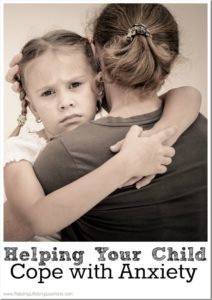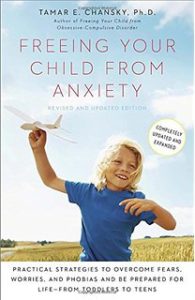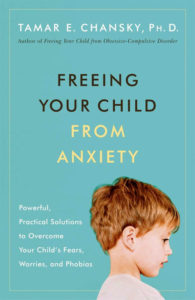
Ben and I went to Delise’s doctor yesterday to get a good handle on what is going on with our sweet 2 year old. She has been demonstrating a lot of aggression and her temper tantrums are almost too much to bear. We knew something wasn’t right so my husband and I took her to a developmental pediatrician and she underwent a series of tests and we underwent a booklet of questions that never seemed to end. In the end, we discovered that our child has severe anxiety. Honestly it was a HUGE sigh of relief. It sounds cruel to say something like that but when the terms autism, sensory processing disorder and ADHD are thrown at you, you start to get anxious yourself. Now we know and can move forward. I started doing my homework and this is what I came up with to help her get through the tough times.
1. The goal isn’t to eliminate anxiety, but to help your child manage it.
None of us wants to see our child unhappy, but the best way to help kids overcome anxiety isn’t to try to remove stressors that trigger it. It’s to help them learn to tolerate their anxiety and function as well as they can, even when they’re anxious. And as a byproduct of that, the anxiety will decrease or fall away over time.

2. Don’t avoid things just because they make your child anxious.
Ben and I are so guilty of this. It is so hard to see your child get anxious and afraid. Helping our children avoid the things they are afraid of will make them feel better in the short term, but it reinforces the anxiety over the long run. If your child in an uncomfortable situation gets upset, starts to cry—not to be manipulative, but just because that’s how she feels—and you whisk her out of there, or remove the thing she’s afraid of, she’s learned that coping mechanism, and that cycle has the potential to repeat itself. Since researching about this, it is something we are going to have to be conscious of when faced with every situation.

3. Express positive—but realistic—expectations.
Oh the Momma Bear and Papa Bear seethes out of us as we try to protect our children from anything that may “hurt” their feelings or cause their anxiety to spike. We can’t promise our child that her fears are unrealistic—that she won’t fail a test, that she’ll have fun ice skating, or that another child won’t laugh at her during show & tell. But you can express confidence that she’s going to be okay, she will be able to manage it, and that, as she faces her fears, the anxiety level will drop over time. This gives her confidence that your expectations are realistic, and that you’re not going to ask her to do something she can’t handle.

4. Respect her feelings, but don’t empower them.
Validation doesn’t always mean agreement. So if your child is terrified about going to the doctor because she’s due for a shot, you don’t want to belittle her fears, but you also don’t want to amplify them.You want to listen and be empathetic, help her understand what she’s anxious about, and encourage her to feel that she can face her fears. The message you want to send is, “I know you’re scared, and that’s okay, and I’m here, and I’m going to help you get through this.”

5. Don’t ask leading questions.
Encourage your child to talk about her feelings, but try not to ask leading questions— “Are you anxious about school? Are you worried about the going to the park?” To avoid feeding the cycle of anxiety, just ask open-ended questions: “How are you feeling about going to the park?”

6. Don’t reinforce your child’s fears.
We don’t want to do is be saying, with our tone of voice or body language: “Maybe this is something that you should be afraid of.” Let’s say our child has had a negative experience with a dog. Next time she’s around a dog, we might be anxious about how she will respond, and we might unintentionally send a message that she should, indeed, be worried. I say “we” because I anticipate Delise’s anxiety every.single.day and tiptoe around it. Something I need desperately to work on.





0 Comments